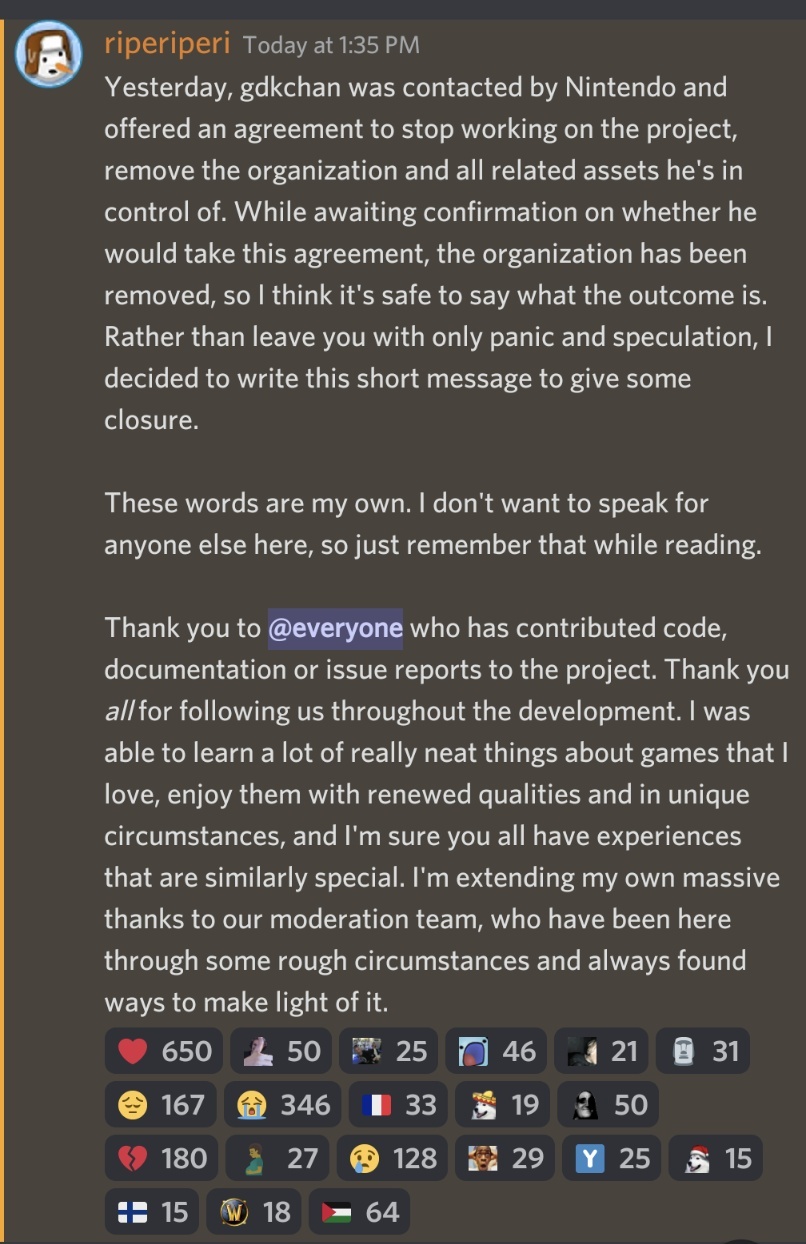They've been on some kind of emulation crusade then, because it looks like they just killed Ryujinx:

They've been on some kind of emulation crusade then, because it looks like they just killed Ryujinx:

I'm really curious to learn how you get calls in so many different languages. I could definitely see Spanish, English, and maybe Vietnamese all being spoken in a general geographic area, but you listed a lot of diverse languages. Pretty cool if that's really all within one area!
They just sent out a mass email to users yesterday informing us of this, I got it too. I wonder if it wasn't getting enough attention, or if they wrote this back in June but only just made the article visible.
People need to understand what this will mean from a developer perspective before getting all up in arms. This initiative is more kneejerk emotional than it is realistic.
If you're going to watch only one of these videos, watch the second one:
I use Backblaze B2, but stored in an encrypted Restic container, set up using this guide:
Restic has been great for automating backups, and even letting me mount the encrypted storage to grab individual files. I like doing it this way since I don't have to trust Backblaze isn't reading my data - I know for sure that they can't.
Performance of storage that is both remote and encrypted is about what you would expect, but I don't need access to the data unless something bad happens.
Ok.... sure. But what physical devices would I use, and what software would they run?
Are there any "open" solutions to mesh networking that can compare to TP-Link Omada? I don't think any open source hardware or software can come close, especially not for the newer Wi-Fi standards.
I haven't bought them yet, but I'm seriously thinking about some Omadas. I imagine I can prevent them from phoning home, and the management software can run locally in a Docker container. Running it like that would be good enough for me even though they're not "open."
I'm planning a rework of my home Wi-Fi, and my current plan is an OPNsense box from Protectli, and a few EAP772's:
https://www.tp-link.com/us/business-networking/omada-wifi-ceiling-mount/eap772/
If there's something comparable/better that's more of an open ecosystem, you definitely have my attention while I'm shopping around for different options.
Definitely recommend Motrix:
If the Google download link supports it, it should be fairly resistant to interruptions. If it doesn't, this might not help much, but you should still use this instead of just a browser.
I haven't tried to download a Google takeout, so you might need to get clever with how you add the download link to it.
If you just can't get it to work, you can try getting the browser extension to automatically send all downloads to Motrix. There is some setup required, though:
https://github.com/gautamkrishnar/motrix-webextension
Good luck!
They have to restrict themselves to pickpocketing roaming NPC fascists.
What? Fascists? RuneScape doesn't have...
Oh. HAM, I almost forgot about those guys.
The guy you were replying to is saying "People hate GrapheneOS because it requires a Pixel," they were not saying "everyone in the world should be using a Pixel" as you seem to have mistaken.
You're getting very fired up and heated in the comments here... maybe take a break?
He did not really step down, it was just a symbolic public gesture. He's still actively contributing to the project, check the GitHub commits and comments. He just stopped having so many Twitter meltdowns.
Not really. 8BitDo really blew it with the Ultimate. They confusingly have two different "versions" of it, and neither have the full range of device compatibility that previous 8BitDo controllers had. The most egregious exclusion from the Ultimate was Xinput over Bluetooth. I still have no idea why they decided to drop that.
If this new controller has Xinput over Bluetooth, all of the compatibility from above, and a strong battery life, it might be a day 1 buy. It will have hall effect sticks, so this sounds like everything I wanted the 8BD Ultimate to be. I hope there aren't any showstoppers once reviews start coming out.